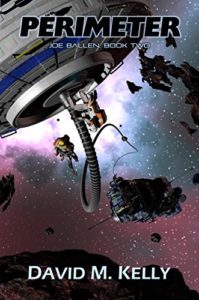~~ Book One ~~

Meet former space engineer, Joe Ballen. These days, he’s scraping a living flying cabs in flooded-out Baltimore, trying to avoid the clutches of his boss and the well-meaning advice of an old friend. When one of his passengers suffers a grisly death, Joe is dragged into a dangerous web of ruthless academic rivalry centered on a prototype spaceship.
As the bodies pile up, Joe becomes suspect number one, and his enemies will stop at nothing to hide the truth. With the help of an enigmatic scientist, a senile survivalist, and the glamorous Ms Buntin, can Joe untangle the conspiracy and prove his innocence before it’s too late?
Mathematics Of Eternity: the first in an explosive SF thriller series by a fantastic new Canadian author.
The future’s about to get a lot more action-packed!

Chapter One
“Negotiations between the assembled Earth nations and Atoll negotiators broke down today, with no relaxation of the restrictions on Earth-based extra-orbital operations. General Chadwick, from the combined Atoll security forces, stated there would be a vigorous response to any attempt by Earth to increase operations outside Low Earth Orbit, other than the Mars mining operation. He also said that this boycott included the starship—”
I stabbed the off-button hard enough to make the plastic click sound like a gun had gone off inside the car. The news shouldn’t have bothered me, but it did. The fact that I used to work in space was part of it—the fact that I couldn’t any longer was another. But mostly it was because the Atolls were right—we didn’t deserve another chance.
I pulled up outside The Kase waiting for the traffic lights to change. The rain on the windshield distorted the garish neon and holo-projections from the bar into painful tracks that burned ghostly afterimages on my retina. I rubbed my face to ease the ache in my eyes, a two-day growth of beard rasping against my palms. Time to polish yourself up a bit, Ballen, otherwise someone’s going to think you stole this cab. It had been that kind of night. The only thing keeping me going was the thought that my tour was over for another twelve hours.
The cab bucked and I grabbed the shuddering controls, wrestling the car into a level attitude. The door hissed open as someone slid in the back. The turbines whined as the stability systems fought to compensate for the shift in weight distribution and for a second I thought we were going to plummet to the ground.
I cursed loudly, my fingers only slowly releasing the death grip I had on the controls as the motions steadied, not caring if my new passenger heard. The old adage was true—there really is always one.
“You better watch yourself, chief.” My cab had been almost a meter away from the Jump-Off platform—a potential disaster when you’re sixty meters up at L4. “That’s not a choice likely to take you to retirement.”
All I could see in the mirror was a dark shadow filling the entire back seat. “I’m off duty. You’ll have to call someone else.”
“Two-Seven-Three Fairland Road, Ell-One. Rossmoor.” The voice had a liquid rasp that didn’t sound like it came from drink alone. More like the death rattle from a set of lungs drowning in a sea of flesh.
Maybe he hadn’t heard. I sure didn’t want a forty-kilometer detour on my own clock. “The light’s out, chief—I’m off-duty. Give me a break and get out.”
I nudged against the Jump-Off and re-opened the door. He didn’t move, and I turned round to get my first proper look at him. Purple and red bar lights reflected on his waxy skin, and he must have weighed well over a hundred-eighty kilos. A sweat-drenched green jacket molded itself to both his torso and the seat, making his face look sickly. I couldn’t remember ever seeing anyone so overweight, outside historicals. Everything about him was bloated. From the head that flowed directly into his shoulders without the benefit of an intervening neck, to the corpulent fingers gripping the worn parahyde seat as if he were scared he’d fall off the world. It was no wonder the car had struggled—he was a one-man weight-restriction violation.
Sometimes when the circuits fail, all you can do is accept it and reroute. There wasn’t a chance I’d be able to get him out single-handed. It would be easier to take him where he wanted to go and hope he was sober enough to get out under his own steam.
I shrugged and hit the meter. The lights had long since gone green, so I eased the throttle forward to minimize any motion sickness. The last thing I needed was the alcoholic excess in his gut emptying in the back of the cab. Then, as if I needed anything else to make my night miserable, an asshole in a Saber cut me up from below. His streamlined tail almost clipping the front of the cab as I wrestled to keep things together in the turbulent wash from the arrest-me red sports car.
I shook my head. “Life’s too short,” I muttered.
“Your statement carries a paradoxical veracity that forms a Universal comedy.”
I hadn’t meant to be overheard and didn’t generally start conversations with drunks. His quirky mannerisms singled him out from the usual fare, though. It’s true you see pretty much every aspect of life while driving a cab, and after two years I’d seen them all. But I’d never had anyone using phrases like paradoxical veracity—not even sober.
“It was a rather discourteous maneuver. You should tag him.”
My jaw tightened. Decades ago, the Saber driver would have been handled by the national sport known as “drive-by shooting.” Now, with the promotion of civic thinking, we had the more humane, if less immediate, option of tagging anti-social behavior. The all-seeing Argus brain reviewed each tag and, if judged guilty, the appropriate points were added to your citizenship record. Amass enough, and you faced fines, community service, or “attitudinal re-adjustment” in severe cases. An electronic voxpop bringing peace and tranquility to the teeming streets and suburbs of the United States and Provinces.
I should have tagged the guy, but I’d never really bought into the idea. My previous life had left me used to the rough and tumble of a more anarchic environment, where you relied on personal relationships and dealt with problems by rolling up your sleeves and getting stuck in when needed. Marking someone with a coded low-energy laser felt a little unsatisfying, not to mention cowardly.
“I guess I’m not quick enough,” I said. “No harm done.”
My passenger’s deep-set eyes seemed to darken in the RearView. “You have a good heart, sir. Most people find it easy to use that particular reflex.”
“You’ve definitely had too much to drink.” His manner and old-fashioned speech piqued my curiosity enough for me to break my own rule and attempt a conversation. “A good night, chief?”
“Good night?” He hesitated. “In the bar?”
“Sure. You were in The Kase, right?”
“Was that its name? I didn’t really take much notice.” He looked out of the window as the city lights from the buildings slipped past us. “I don’t get out much.”
His size made that seem likely. “You must have had a good few drinks if you don’t know where you were. Was it a celebration?”
“Oh, I wasn’t drinking. I’ve been in so many bars tonight I don’t remember them all.”
I was getting annoyed now. Not with my passenger, but with myself. I’d broken my no-engagement rule, and now it turned out he was simply another drunk who couldn’t remember how much he’d had, or where he’d been. Besides, I should have been home. “What were you doing then? Those places only have one purpose.”
“I bought a lot of people drinks. They seemed to enjoy it.”
“That’s pretty generous. You must be one of those eccentric millionaires I see in the trashy Solidos.”
“Millionaire?” He seemed genuinely surprised and coughed wetly. “No, I’m not especially wealthy. Money doesn’t matter anymore.”
“It does to some of us, chief.”
I followed Broadway south, passing over the bloated wetlands that stretched across the old Inner Harbor and Federal Hill. The once grand buildings footed several meters in the water lapping around their crumbling lower levels. Many were flood-thrus, but I could see faint glimmers of light creeping out of the grimy windows. Wet-foot didn’t care where they lived. All they wanted was a roof over their heads. Danger and disease didn’t deter them in the slightest.
“They should put those people in proper buildings.” The liquid voice rolled out of the darkness of the back seat. He must have followed my gaze and guessed what I was thinking.
The Big Shake and rising sea levels had driven people inland, away from the encroaching ocean. Waterfront property no longer commanded a premium—it was a danger to be avoided. As a result, even the most precarious of condemned buildings held groups of otherwise homeless residents. Not all of them lived there illegally—as long as you stretched the definition of legal. City health ordinances were often “overlooked,” and upper-level apartments in buildings that should have been torn down, or concrete-filled as sea defenses, were frequently rented out. Sometimes at ridiculous prices, but when you’ve lost everything, even crap is better than nothing.
We swept over the distended extremes of the Patapsco, pushing west until we hit Silver Lake, then I settled the car into Airway Six which followed the path of the old Highway One, heading southwest. I kept the car within the 100/100 ‘City’ zoning limits as we followed the track of the highway, the ribbon of crumbling pavement lined with equally crumbling buildings that looked like splintered teeth pushing out of a jawbone of some huge leviathan.
“Housing isn’t the problem,” I said. “There are subdivisions past the old Beltway virtually empty, thousands of homes—but those people can’t afford even subsidized rent.”
“That can’t be.”
My passenger sounded shocked, and I wondered where he’d been hiding. The FabHome scandal had left swathes of houses built with taxpayers’ money lying empty and slowly falling apart, while city officials enjoyed generous business trips. It was an old story even back when Ramses was building pyramids, but fresh enough to fill the news for the last three months. Human altruism at its finest.
We finally escaped the limiters past Larch, and I lifted the nose, bringing the cab up to 500 meters while boosting to 200 klicks. The landscape was flat, and outside the managed traffic zone I was free to use my own discretion, as long as I didn’t break the general free flight regs for an AeroMobile. Of course, the cab could have managed all this on its own, but since the ICab debacle, a human driver was mandatory.
“They should let those poor unfortunates have those houses for free. Are people really that selfish and greedy?”
“Free? That’s a four-letter word with a lot of people.” The Pilot beeped several times, warning me of our imminent arrival. I throttled back and did a slow drift, spiraling around the U-shaped apartment building as I brought the car down outside the main entranceway at L1—ground level. “Talking of which, we’re here, and you owe an even fifty-five.”
He didn’t answer, so I turned to encourage his exit. I could hear his breathing, the wheezy inhalation of air followed by an almost spluttering exhalation. For a moment, I thought he’d fallen asleep and cursed, wondering how the hell I’d get him out. Then I noticed tears rolling down his fat cheeks.
“There’s a girl.”
“There usually is…” Something in his tone made me think he wasn’t using the word girl euphemistically. “Maybe you should keep that to yourself though.”
He leaned forward, and I tasted his fetid breath as it filtered through the screen. “Take care of her.”
“Sure… don’t worry, chief, I’ll take care of it.” All I wanted was to get him out of the cab so I could go home. “Now go sleep it off. Everything will look better in the morning.”
“Sleep? Yes. ‘What dreams may come?'” His voice sounded tiny and afraid—like something was eating him up inside. “I don’t want to be alone.”
“No one does. Call your girl tomorrow and apologize. It’ll be fine.” It was time to draw this melodrama to a close. “Look, chief, I’ve got a wife and kids waiting. If I don’t get home soon, I’ll be alone too.” It was a lie, but claiming a family usually helped with drunks.
He dragged his credit chip out from a pocket and tapped it against the payment scanner. A couple of seconds later it let out a doleful beep, and the screen flashed with a red declined warning. The doors locked automatically, and the plastic security window between me and the passenger compartment shuttered tight.
“I have no money left?” His tear-streaked face swam close to the transparent barrier. “I must have spent it in the bars. I’m so terribly sorry.”
It was more likely the bank had stopped his credit chip if he’d been as generous as he claimed, but my patience was exhausted. I got out and manually unfolded the back door, opening it wide. “Come on, chief. Forget the money and get out.”
“I’m sorry for causing trouble, I really am.” He shuffled part way through the door. The car dipped alarmingly on its landing gear, and I was glad I was dropping him off at ground level. “I have some cash in my apartment. I’ll get it and return immediately.”
“I may look stupid, but I’m not. I am tired though.” I sighed. “Get out of here before I change my mind. I won’t even watch what direction you go.”
He struggled out, barely making it even with the door opened fully and again I wondered how he’d managed to get in at the lights. Maybe he was an acrobat under those layers of flab, but it seemed unlikely.
“Please, don’t be angry.” His eyes shone like two titanium bearings freshly bathed in oil. “I will bring you some money, I promise. This won’t take very long.”
My boss is pretty tight when it comes to non-payers, but I really didn’t care. All I wanted was a hot shower and a cold beer—not necessarily in that order—but if agreeing would get him out of my hair then I’d play along. “Okay, you get some cash. I’ll wait five minutes and if you choose not to come back, don’t worry. I won’t be disappointed.”
He nodded profusely, tears running down his face as he waddled towards the arched entrance. I was surprised when the entry system recognized him and allowed him into the protected interior. I leaned against the car, wondering whether to cut my losses or give the guy the benefit.
The condo had that bare functionality mixed with quality workmanship typical of late-twentieth architecture, all sharp lines and black quartz walls mixed with a pinstripe steel exoskeleton. It was probably part of the growth of designed communities that enjoyed a brief popularity before their eco-conscious designers gave up and went back to making money. It wasn’t the kind of place I’d associate with drunken non-payers, but that didn’t mean anything. His claim to have real cash was intriguing. I hadn’t seen any in years and wondered if I’d still recognize it.
A light flickered several floors up, outlining a pagoda style section forming the top floor corner of the U, and I saw an unmistakable shadow totter past thinly screened windows. A penthouse then—maybe he was genuine.
There was a faint smell of cooked meat in the air. It could have come from the apartments, but at that time of night, it was more likely a NeverSee in the sewer. It wasn’t pleasant—maybe cat or something even worse. I pulled out my Scroll and, with a slight sense of embarrassment, called up the inappropriately-named WorldLink News—one of the sleaziest news-tabs. I’d be the first to admit it was mostly mindless dross, but it held a perverse fascination. I opened up the classifieds—nothing else reveals the true depths humanity can sink to any better—and scanned various enigmatic headlines.
My mind was toying with the delights of “Willy. Got the powder, you still got the meat? H.,” when a sickening wet impact shattered my guilty entertainment. A heartbeat later a burning snap of something stabbed deep into the back of my shoulder, and I staggered forward. Time seemed suspended in the dust-heavy wind as the Scroll slipped from my fingers and clattered on the rough concrete paving.
I turned—not having to look far for the source of the sodden explosion. A lump of still-quivering gelatinous protoplasm was splashed over the pavement a few meters away. Snakes of uncoiled intestine slithered towards me as the moist, salty odor from the steam drifted into my nostrils on the cold night air.
Twin rows of burst ribs reached upwards through the green jacket, like claws from a pair of cupped hands begging for more. Remnants of a head were scattered across the sidewalk, its once precious cache discarded in a casual puddle of gray and crimson mucous.
I wasn’t going to get my fare after all.
…Copyright (C) David M. Kelly. Read more at http://davidmkelly.net/moe/ .
~~ Book Two ~~
Ballen’s back in another action-packed sci-fi noir thriller, guaranteed to keep you turning the pages.
PERIMETER – In space, treachery runs deep
Joe Ballen’s working on a new ore-processing platform in the harsh environment around Mercury. When a savage Atoll attack decimates his crew, Joe is injured and must return to Earth to recover. While it’s a setback for the project, at least it means he can rebuild his relationship with his wife after nearly a year away.
But then the security forces come calling. Vital starship engineering files are missing, and without them Earth has no hope of escaping Atoll domination. Someone has to locate the files, and Ballen is bulldozed into the not-so-choice assignment.
But he’s not the only one in the hunt. As Joe struggles to find the data, he becomes tangled up in a high-stakes game of cat and mouse. It’s a journey that will take him to the perilous depths of space, where no one is quite what they seem. Can old enemies ever make good allies? And can Joe trust even the people closest to him?

David M. Kelly writes intelligent, action-packed SF. He is the author of the novel, Mathematics of Eternity and the short story collection Dead Reckoning And Other Stories. He has been published in Canadian SF magazine Neo-opsis.
David’s interest in science and technology began early. At the age of six his parents allowed him to stay up late into the night to watch the television broadcast of Neil Armstrong stepping on to the surface of the moon. From that day he was hooked on everything related to science and space.
An avid reader, he worked his way through the contents of the mobile library that visited his street, progressing through YA titles (or ‘juveniles’ as they were known back then) on to the classics of Robert Heinlein, Isaac Asimov, Arthur C. Clarke, and Harry Harrison.
David worked for many years in project management and software development. Along the way his interests have included IPSC combat (target) pistol shooting, crew chief on a drag racing team, and several years as bass player/vocalist in a heavy rock band. He also managed to fit in some real work in manual jobs from digging ditches and work on production lines to loading trucks in a haulage company.
Originally from the wild and woolly region of Yorkshire, England, David emigrated to Canada in 2005 and settled in Northern Ontario with his patient and supportive wife, Hilary. Foot surgery in 2014 temporarily curtailed many of his favourite activities – hiking, camping, piloting his own personal starfighter (otherwise known as a Corvette ZR-1). But on the plus side, it meant a transition from the world of IT into life as a full-time writer—an opportunity he grasped enthusiastically.
David is passionate about science, especially astronomy and physics, and is a rabid science news follower. Never short of an opinion, David writes about science and technology on his blog davidmkelly.net. He has supported various charity projects such as the Smithsonian’s Reboot The Suit and the Lowell Observatory Pluto Telescope Restoration. He also contributes to citizen science projects such as SETI@home.
Website (sign up to my newsletter )

